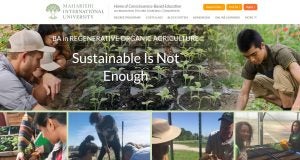Picture it. The Farmer’s Daughter USA is lecturing companies about disparaging modern agriculture through marketing. She’s highlighting how food companies use meaningless terms like “all natural” to sell their product. She’s pointing out how describing your product using some terms, like “clean,” imply something negative about others, like dirty. In sum, she’s cutting through the bull to get to the truth.
And then your marketing guru decides to ask The Farmer’s Daughter USA to review your product, enroll in your ambassador program, or promote your goods. Except, your company uses all those marketing gimmicks that she criticizes. This isn’t going to end well for you.
It. Happens. All. The. Time.
My inbox is constantly full of these offers, mostly starting out by saying something like, “I read your content and thought you were a great fit!” Some are spammy, and I ignore them. Others just want me to write a “news” piece about their company as a form of advertising. (This article for AGDAILY was inspired by one of those requests.) But now and then the offers are legitimate, and the companies are willing to give me freebies or pay me real cash to jump on their bandwagon. (And for the record, if I ever accept those offers, I always disclose them.)
My favorite example is Bakerly. Their marketing person reached out to me to review their products. I agreed to do it, but told her I had to be honest in my post. So if I didn’t like their bread, I would have to say so. Not a problem! The company sent me a huge box filled with different breads, fun stickers, an apron, and even confetti.
I wrote my review honestly (you can still find it here). The stuff was great, but all the marketing nonsense completely turned me off. And I told my readers that — I like the product, but would never actually buy it. I was so savage that I ended the piece with, “Great product, bad marketing. Too bad.” Unfortunately, no one ever shared with me the fallout that I’m sure occurred. (Sorry, not sorry.)
I recently received an email that I initially thought might be one of those golden opportunities. Maharishi International University offered to make me one of its referral partners for a new degree program: Regenerative Organic Agriculture. I’d receive $550 for each referral who completes an application for the master’s level program.

In hindsight, the opportunity may have been quite lucrative, depending on how much the application costs to submit. But my complicated relationship with “regenerative” agriculture is what really piqued my curiosity.
Regenerative is definitely the marketing buzzword of the moment, and companies are scrambling to use it. What the heck does it mean though? The best I can tell is that it’s meant to imply agricultural production that focuses on soil quality, though there’s no generally accepted definition. But if that’s the case, then the term seems unnecessary because most farmers care about healthy soils to keep their farm productive year over year. So while I support the goal generally, the term “regenerative” is just redundant.
And if regenerative is just some dreamy sustainability term, what exactly were the good professors at MIU going to teach aspiring regenerative-organic farmers?
What I discovered was wild.
First, let’s talk about MIU itself. The school in Iowa was established in 1972 based on the teachings of Maharishi Mahesh Yogi, an Indian seer who promoted something called transcendental meditation. According to a New York Times article written in 1992, Yogi’s teachings “are woven into the mathematics, physics, and every subject taught there, much the way Christian or Jewish ideas become a part of a teaching at colleges with strong religious affiliations.”
But here’s the part where everything fell into place for me. None other than John Fagan is associated with MIU. His name pops up from time to time in the non-GMO, pro-organic circles. He’s the chief science officer for Genetic-ID, a company that works closely with the Non-GMO Project testing the presence of GMOs in certified foods. Fagan’s beliefs about agriculture are quite …unconventional. He espouses the belief that crops grown with the Maharishi Vedic organic method have six-to-eight times the vitamins and nutrition of conventionally grown crops. He attributes the difference to Maharishi-trained vedic pandits (uh, kinda like monks?) that use the “sound of nature” drawn from the “unified field” during specific phases of the crop’s life.
Uh, I have no idea what that means either. But it comes from the chief science officer of a Non-GMO Project testing lab. So interpret that as you will.
MIU’s program in regenerative agriculture follows in the same tone. Students can take classes dubbed “consciousness in agriculture” and “exploring consciousness.” The electives include a history of organic agriculture and medicinal herbs cultivation, processing, and quality control. Of course, students also take classes in Transcendental Meditations and learn within a Conscious-Based education system.
I mean, how can you even be a farmer unless you learn how to meditate with your crops, create your own homeopathic drugs, and become one with the soil? Nope, nothing to see here …
By the way, MIU, please consider this my declination of your invitation to be a compensated referral source. I don’t think I could keep a straight face while telling prospective students all about your incredible school and program.
Correction 12/05/2022: An earlier version of this article misstated how MIU’s referral program works. The article has been updated.
Amanda Zaluckyj blogs under the name The Farmer’s Daughter USA. Her goal is to promote farmers and tackle the misinformation swirling around the U.S. food industry.



